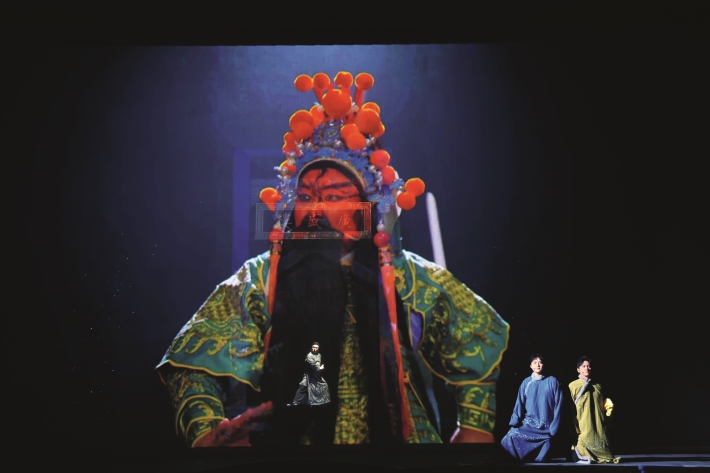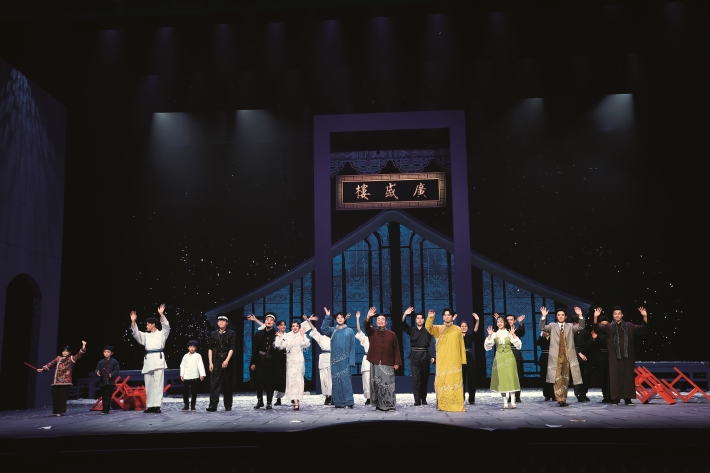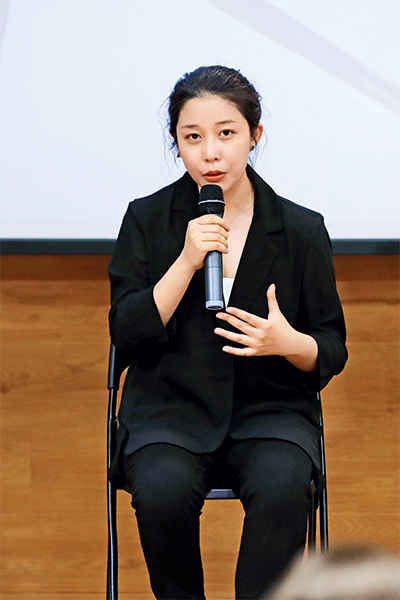|
||||||||||
| Home Top News Economy/Tech Culture/Sports China in Foreign Eyes Green Development Videos Intangible Cultural Heritages |
|
||||||||||
| Home Top News Economy/Tech Culture/Sports China in Foreign Eyes Green Development Videos Intangible Cultural Heritages |
| ChinAfrica |
| A Refreshing Fusion |
| A new style of musical show presents the charm of Chinese opera to younger audiences |
| By Li Yin | VOL. 16 August 2024 ·2024-07-30 |

The laser projection of a Peking opera actor is used in a show to complement the performance of the other actors (COURTESY)
The premiere of the Chinese opera-style musical Snow Embracing the Blue Pass on 21 June was a spectacle of excitement and cultural richness. On stage at Beijing’s Tianqiao Theater, music players, Chinese opera performers, and drama actors performed in perfect harmony, showcasing their extraordinary talents in one show.
The stage design was intentionally minimalist, with only a table and two chairs serving as the primary set pieces, mirroring the aesthetic simplicity of traditional Chinese opera. The intricate traditional opera costumes, gorgeous makeup, and powerful vocal performances repeatedly drew applause and cheers from the audience, whose emotions were deeply stirred as the plot thickened and conflicts unfolded.
The performance reached its zenith when a celebrated opera actor delivered a passionate rendition of an excerpt from Peking opera A River All Red that narrates the tale of the ancient patriotic hero Yue Fei and his resistance against invaders. Enhanced by laser projection, a colossal image of a fully costumed Peking opera actor appeared on the front curtain, synchronising with the actor’s powerful singing. This visual and auditory fusion captivated the audience, intensifying the solemnity of the scene. The meticulous details of the elaborate costume and makeup were rendered vividly through the grand projection, leaving a lasting impression on all in attendance.
The original musical theatre Snow Embracing the Blue Pass narrates the story of Xi Cheng She, a Chinese opera troupe during Republican China. Led by the veteran actor Bai Xixiang and his two apprentices, Jin Tianqing and Mu Xuanqing, the troupe faces existential threats from the turbulence of war and revolution. Against such a backdrop, the characters grapple with the dilemma of whether to fight or compromise, symbolising the broader conflict between conservatism and reformism. Under the inevitable influence of the times, this ideological struggle, patriotic sentiments, the fraternal-like bonds between teacher and students, and the difficult choices individuals face in times of adversity are at the heart of this show. After the first round of five performances over three days, this musical will be further refined before embarking on a nationwide tour.

A scene from the musical Snow Embracing the Blue Pass (COURTESY)
Innovation and integration
For contemporary opera performers, merely preserving tradition is no longer viable. It has long been recognised that innovation in content and form is imperative for the continued evolution of this ancient art form. The fusion of Chinese opera and musical theatre is an area that has garnered significant attention within the industry. Numerous recent productions have experimented with incorporating elements of Chinese opera, exploring new possibilities for this storied art form.
Compared with previous attempts, Snow Embracing the Blue Pass has achieved significant breakthroughs in both the quantity and quality of Chinese opera elements integrated into the show. It represents the realisation of a new and unique genre of musicals: the Chinese opera-style musical. This production is the first to be labelled as such, showcasing a comprehensive incorporation of Chinese opera elements throughout the entire production.
This brand-new form of musical is the result of the concerted efforts of professionals from both the musical and Chinese opera realms. Despite their diverse backgrounds, they share common ideals and a willingness to take risks for such an ambitious project, forging ahead amidst uncertainty, pooling their resources to bring this unique vision to life.
For a diverse group of actors to collaborate effectively and present a cohesive musical show, the composer serves as the essential “glue”. Tu Youqin, a composer who gained popularity by creating numerous popular songs with traditional Chinese elements, transitioned into musical theatre songwriting. Her extensive experience in songwriting and her efforts to popularise Chinese opera have equipped her with a thorough understanding of diverse Chinese opera composing techniques, laying a solid foundation for her work in this show. “There is still a vast potential audience for musicals in China. We should not be constrained by the preferences of existing audiences. Instead, I believe it is a creator’s duty to push the boundaries and introduce new elements to our audiences, but in a thoughtful manner,” Tu told ChinAfrica.

Tu Youqin at a pre-show meet and greet event on 3 June (COURTESY)
Exploring the way forward
At its core, Chinese opera is fundamentally about storytelling through singing and dancing. It is China’s equivalent of musical theatre. Its diminished vibrancy in modern times can be attributed to its inability to keep pace with contemporary trends and a shortage of professionals capable of extracting its essence and integrating it into current popular arts. This collaboration creates opportunities for a wider audience to appreciate traditional opera in new contexts, revitalising this ancient art form on a modern stage.
Director of this musical theatre Li Chaolin believes that to bring traditional Chinese opera into the lives of more young people, it is essential to attract their interest by demonstrating its characteristics with new forms of performances that give this traditional art form a modern appeal.
Gao Yang, the presenter and leading actor of this musical, observed that many audience reviews mentioned how the performance awakened a sense of national identity. The rich and diverse cultural connotations of Chinese opera encompass a multitude of regional varieties across China, each with its own unique characteristics that integrate historical, cultural, and folk customs. There are numerous possibilities for combining and exploring these elements, allowing for the presentation of diverse stories and themes. In the future, this could lead to the creation of many unique and innovative works.
As a highly representative symbol of Chinese culture, Chinese opera can bring a refreshing experience to audiences in China’s performance field by embracing modern adaptations and utilising contemporary stage performance techniques.
|
||||||||||
| About Us | Contact Us | Advertise with Us | Subscribe |
| Copyright Beijing Review All rights reserved 京ICP备08005356号-5 京公网安备110102005860号 |